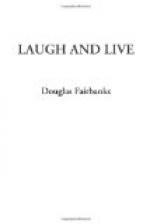“A few good books, digested
well, do feed
The mind.”
“Feed the mind!” That’s the idea—but how shall we feed it? The answer is easy—with something worth while—something that will inform and inspire. We can cram our minds to the point of indigestion with useless, frivolous information just as easily as we may cram our stomachs with certain foods that tear down rather than build up. The habit of reading the right sort of books should begin early in life and continue throughout our days.
Good books are real ... and as we read we feel, hear, see and understand in the way the author did. If what is said appeals to our way of thinking a new world is unfolded to our vision filled to the brim with things we can think about and add to our stock of knowledge. While we are buried in its leaves we may live over the thoughts that the writer lived. For the time being he becomes as real and vital to us as the dearest friend we possess. Gradually, as the time passes by, he creeps into our affections until our lives would not be complete without the comradeship of his cherished book.
Books that become our “pals” are not necessarily books of the so-called classical type. Little known volumes may prove to have enough thought stored away between their covers to keep us interested all our days. The great books will prove their worth in a short time no matter how poor the binding, how bad the type or how cheap the paper. These things are after all only the outward manifestations and though we like to see our friends dressed well yet we know that the clothes do not make character unless there is character there in the first place. And so it is with books. These little ungainly volumes which we purchase on the stands may be the classics of tomorrow ... who knows?
We select our library carefully. No matter if we live in a tiny hall bedroom on the top floor of a boarding house we have a shelf somewhere with a few good books on it. Emerson’s “Essays” can be had in one volume and are well worth having. No other American writer has been so inspiring, so invigorating as this thinker of Concord. One cannot read his essays without having a desire to get up and do. It is like a breath of fresh air ... a tonic ... a stiff morning walk. It stirs the mind to action and inspires us to lift ourselves out of the rut into which we have fallen. One returns to them time after time, each reading opening up new vistas of thought, new lines of mental development.
[Illustration: A Scene from “His Picture in the Papers"]




